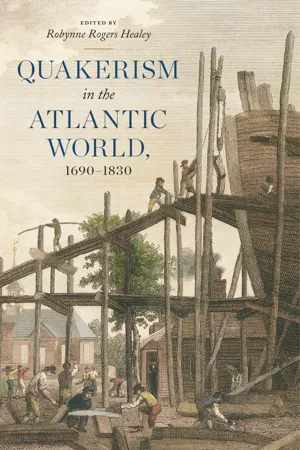
- English
- PDF
- Available on iOS & Android
Quakerism in the Atlantic World, 1690–1830
About this book
This third installment in the New History of Quakerism series is a comprehensive assessment of transatlantic Quakerism across the long eighteenth century, a period during which Quakers became increasingly sectarian even as they expanded their engagement with politics, trade, industry, and science. The contributors to this volume interrogate and deconstruct this paradox, complicating traditional interpretations of what has been termed "Quietist Quakerism."
Examining the period following the Toleration Act in England of 1689 through the Hicksite-Orthodox Separation in North America, this work situates Quakers in the eighteenth-century British Atlantic world. Three thematic sections—exploring unique Quaker testimonies and practices; tensions between Quakerism in community and Quakerism in the world; and expressions of Quakerism around the Atlantic world—broaden geographic understandings of the Quaker Atlantic experience to determine how local events shaped expressions of Quakerism. The authors challenge oversimplified interpretations of Quaker practices and reveal a complex Quaker world, one in which prescription and practice were more often negotiated than dictated, even after the mid-eighteenth-century "reformation" and tightening of the Discipline on both sides of the Atlantic.
Accessible and well-researched, Quakerism in the Atlantic World, 1690-1830, provides fresh insights and raises new questions about an understudied period of Quaker history.
In addition to the editor, the contributors to this volume include Richard C. Allen, Erin Bell, Erica Canela, Elizabeth Cazden, Andrew Fincham, Sydney Harker, Rosalind Johnson, Emma Lapsansky-Werner, Jon Mitchell, and Geoffrey Plank.
Frequently asked questions
- Essential is ideal for learners and professionals who enjoy exploring a wide range of subjects. Access the Essential Library with 800,000+ trusted titles and best-sellers across business, personal growth, and the humanities. Includes unlimited reading time and Standard Read Aloud voice.
- Complete: Perfect for advanced learners and researchers needing full, unrestricted access. Unlock 1.4M+ books across hundreds of subjects, including academic and specialized titles. The Complete Plan also includes advanced features like Premium Read Aloud and Research Assistant.
Please note we cannot support devices running on iOS 13 and Android 7 or earlier. Learn more about using the app.
Information
Table of contents
- COVER Front
- Copyright Page
- Table of Contents
- Acknowledgments
- Introduction
- Chapter 1: “Our Dear Friend Has Departed This Life” Memorial Testimony Writing in the Long Eighteenth Century
- Chapter 2: “Within the Bounds of Their Circumstances”The Testimony of Inequality Among Eighteenth-Century New England Friends
- Chapter 3: Friendly Advice The Making and Shaping of Quaker Discipline
- Chapter 4: Three Methods of Worship in Eighteenth-Century Quakerism
- Chapter 5: “Mrs. Weaver Being a Quaker,Would Not Swear” Representations of Quakers and Crime in the Metropolis, ca. 1696–1815
- Chapter 6: Quakers and Marriage Legislation in England in the Long Eighteenth Century
- Chapter 7: Family, Unity, and Identity Formation Eighteenth-Century Quaker Community Building
- Chapter 8:: Quakers, Indigenous Americans, and the Landscape of Peace
- Chapter 9: A Complex Faith Strategies of Marriage, Family, and Community Among Upper Canadian Quakers, 1784–1830
- Chapter 10: Industrial Development and Community Responsibility The Harford Family and South Wales, ca. 1768–1842
- Bibliography
- index